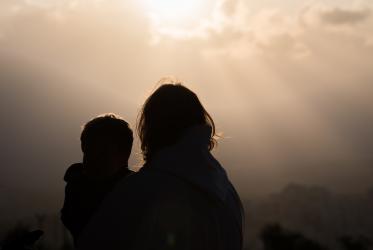Rev. Dr Olav Fykse Tveit, General Secretary, World Council of Churches
Ecumenical Centre, 24 April 2017 at the occasion of the visit of
The Ecumenical Patriarch, His All Holiness Bartholomew I
Your All Holiness,
Dear Guests, Your Eminences, Your Excellences,
Colleagues in the Ecumenical Centre,
Ladies and Gentlemen,
Sisters and Brothers in Christ,
Welcome to this very special event in the Ecumenical Centre! On behalf of the World Council of Churches and our sister organisations here in this house, we welcome Your All Holiness, The Ecumenical Patriarch, The Archbishop of Constantinople – the New Rome, Bartholomew I. This is a great honour for us that you are again visiting the centre, and that we have this opportunity to listen to your perspectives on the ecumenical movement.
This is, most honourable audience, a unique opportunity to meet with one of the most respected international Church leaders of today. I would say, as well, one of the most respected international leaders of our time. At this occasion we celebrate his 25 years as the primary spiritual leader of the Eastern Orthodox Churches. As Ecumenical Patriarch he also has a significant role in giving leadership in the wider ecumenical fellowship of the World Council of Churches – and beyond. At several occasions he has met with Pope Francis to address some of the urgent crises in the world today, like you did last year at the Greek island of Lesvos. This week we will as WCC be together with both of you in Cairo to strengthen the Muslim-Christian joint work for peace.
In his capacity as leader in the Orthodox world he is a world leader many listen to, far beyond the Orthodox faithful. He contributes to developing and checking the moral compass and gives guidance in many of the most significant and threatening issues for humanity and the whole creation in our time. Before many others, he raised the attention to the environmental crisis of the world, particularly the threats to the oceans, seas and rivers of the world, through his “sailing seminars”. We had one of them also along the coast of Norway in 2003.
In all these capacities we meet a Christian leader showing that the basic moral principles of the Christian faith - and many of them we share with other peoples of faith - are relevant in giving guidance for our life together. He also shares his rich experience and wisdom with others with the Christian attitudes of accountability to God and to the whole of God’s creation.
On a personal note I can affirm that I have learned from the courageous initiatives, wisdom and the commitment of His All Holiness, as have many others with tasks of leadership in the churches and in the ecumenical movement.
We met in his office in Fanar in Istanbul in December 2016, to again share reflections of the ecumenical movement and the challenges of the world in our time. With his great hospitality we were received, and the conversation was both enlightening and encouraging.
The first time I had the privilege to listen to him, was the day I was appointed to be the general secretary for the Council for Ecumenical and International Relations of my own Church, the Church of Norway. As I was interviewed that day in June 2002 about my new role and what visions I had for the work ahead of me in, by coincidence – or by providence – the Ecumenical Patriarch Bartholomew was in Oslo to receive the Sophie Prize for his outstanding initiatives for the care of the environment.
It was a moment for me to see and hear a vision for the ecumenical and international work, and a model of leadership that has remained so for me also in this role here in the WCC. I was inspired by the clarity with which he was sharing the most basic and prophetic dimensions of our faith, sharing it with any audience, encouraging them to take the moral high ground in our care for humanity, for human rights, for justice and peace, but also – and particularly – for the whole of God’s creation on this planet earth where we all live.
I sensed a deep sense of wisdom, coming from insight in the Gospel. The richness of the Orthodox Christian tradition and teaching has been accessible and a source of inspiration for many through his speeches. He shows an open mind for the richness of the ecumenical dialogue - and for the inter-faith dialogue, but also firm and clear in the positions presented from the Orthodox churches. I continue to learn what ecumenical leadership means in our time.
Today we all have this privilege. Welcome, Your All Holiness. The floor is yours.



